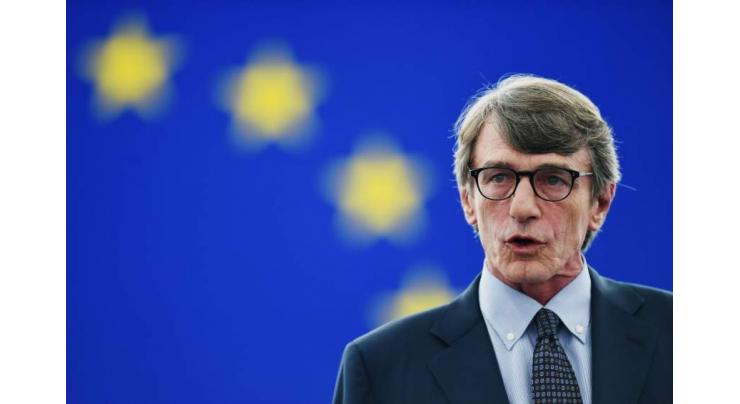
EU Parliament Head Calls For Resilience Against Retaliatory Measures Of Trade Partners
Faizan Hashmi Published January 22, 2020 | 08:16 PM

European Parliament President David Sassoli said on Wednesday that the European Union needs to come up with a policy that would ensure it is not susceptible to retaliatory measures coming from foreign trade partners as part of a greater strategy for bloc-wide economic, social and environmental sustainability
MOSCOW (UrduPoint News / Sputnik - 22nd January, 2020) European Parliament President David Sassoli said on Wednesday that the European Union needs to come up with a policy that would ensure it is not susceptible to retaliatory measures coming from foreign trade partners as part of a greater strategy for bloc-wide economic, social and environmental sustainability.
Last week, as France, Germany and the United Kingdom said they would invoke the dispute resolution mechanism of the Joint Comprehensive Plan of Action over Iran's violation of its nuclear commitments, media speculated that they could have been pressured into the move by the United States which threatened them with a 25 percent tariff on all auto imports.
"We want to have a policy which does not allow ourselves to be buffeted by the actions of our partners who can take trade retaliatory measures," Sassoli said in his address at the World Economic Forum in Davos.
According to the EU parliament chief, for Europe to "assume moral leadership of the world and be able to meet the demands of today's society," it needs a fundamental rethink of its policies that must have all three of the economic, social and environmental facets enshrined in it.
For example, he said that tackling climate change only makes sense together with tackling economic inequality as egalitarian societies have proven to be more successful in organizing themselves into environment-friendly economies.
Sassoli said any such change at the EU level � be it a more just tax system or rethinking economic activity in terms of growth rather than prosperity � will need to be reflected at the national level of member states.
The nuclear deal was signed in 2015 by Iran, China, France, Germany, Russia, the United Kingdom, the United States, and the European Union. In May 2018, the US unilaterally withdrew and hit Iran with sanctions. Since May 2019, Iran has been gradually abandoning its own nuclear commitments, with the last batch dropped on January 5, as Tehran said it would no longer comply with permitted levels of uranium enrichment.
The 50th annual World Economic Forum began on Tuesday and will run through Friday in the Swiss Alpine town of Davos.
Related Topics
Recent Stories

SC orders end of encroachments in Karachi

Nazish Jahangir denies viral screenshots, calls them fake

Govt likely to hike electricity price once again

Bismah Maroof announces immediate retirement from international cricket

Malala expresses unwavering support for Gaza people

Selection committee dissolved over Pakistan women cricket team's poor performanc ..

Punjab CM Maryam Nawaz in police uniform at Chung police center

Currency Rate In Pakistan - Dollar, Euro, Pound, Riyal Rates On 25 April 2024

Today Gold Rate in Pakistan 25 April 2024

Mired in crisis, Boeing reports another loss

Session Awarding Ceremony 2024 held at Cadet College Muzaffarabad

Austrian ski great Hirscher to make comeback under Dutch flag
More Stories From World
-
China continues to battle flood in Pearl River basin
4 minutes ago -
Death toll from Tanzania's flash floods rises to 155: PM
14 minutes ago -
Iron ore futures close higher
24 minutes ago -
Two runaway army horses in 'serious condition': UK minister
24 minutes ago -
Myanmar's health ministry issues heat advisory amid soaring temperature
34 minutes ago -
Russian oil production facility in Siberia catches fire
34 minutes ago
-
Hong Kong's Hang Seng Index closes 0.48 pct higher
34 minutes ago -
Kremlin says Ukraine access to ATACMS will not impact outcome of conflict
44 minutes ago -
Scottish leader scraps coalition deal with Greens
44 minutes ago -
US announces sweeping cuts to power sector carbon emissions
2 hours ago -
US to give Micron $6.1 bn for American chip factories
2 hours ago -
Venice launches five-euro entry fee
2 hours ago